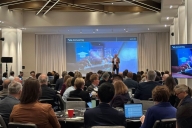You have /5 articles left.
Sign up for a free account or log in.
Coverage of literary scholarship in the mainstream news media leaves some academics asking, “Why are they saying such terrible things about us?”
In fact, that question was the subtitle of a paper presented Wednesday by David R. Shumway, a Carnegie Mellon University English professor, at the Modern Language Association’s annual convention in Washington.
“The lack of respect afforded the humanities in the press is something most of us will agree upon,” Shumway said, adding that literary scholars are, at best, ignored or used on occasion for an expert sound bite by reporters. In more malicious cases, Shumway said, journalists seize on opportunities, like the MLA convention itself, to lampoon what they see as the egg-headed elite and their esoteric, out of touch ramblings.
“How many times have we seen the headline ‘Jane Austen and the masturbating girl?’ ” asked Jeffrey J. Williams, an English professor at Carnegie Mellon, to a few groans from the audience. He was referring to the title of a past MLA paper that lit up headlines as if it were the centerpiece of the entire 1995 convention.
Shumway argued that “reporters who cover academics are in competition” with the humanities community for public influence, so it is in journalists’ interest to deny academics the privilege to preach specialized knowledge, and to “create a world where [the journalist’s] own knowledge is enough.”
For their part, the journalists on the panel told the professors that they cannot cling to the elite sensibility that comes with specialized knowledge, and then expect that knowledge to be constantly thrust upon a wide audience.
A paper by Richard Byrne, an editor at The Chronicle of Higher Education who was unable to attend the session, referred to the press coverage of the MLA convention as the “annual lashing with a wet noodle,” and said that journalists should pay significant attention to academics who do work that bears on the current interests of readers. “It isn’t,” however, his paper read, “the journalist’s job to build an audience for humanities.”
Scott McLemee, a columnist for Inside Higher Ed, noted that the professors who spoke had qualified their remarks, saying they were only talking about the publications they thought were doing a less than ideal job -- often prominent newspapers and conservative publications. “If you want to leave The Nation and The New York Review of Books out of ‘journalism,’ that’s fine, but that is a strategic move,” he said.
McLemee said that the divide between humanities professors and journalists is partly a function of each discipline defining its own domain. In order to "professionalize" literary scholarship, he said, scholars require that journalists "cannot get what [scholars] do," so they fill papers with esoteric terminology, and often spurn discourse with the uninitiated. McLemee cited what he called an "asymmetry of expertise between the scholar" and the audience. "Who is the consumer of literary studies knowledge?" he asked. "I never see that question answered." He said that journalists, through reporting, are "testing whether a theory has any traction with consumers," whereas scholars often craft their writing without a consumer in mind. "You need to persuade people not on the 'inside' that your work is of value," McLemee said.
Jennifer Ruark, an editor at The Chronicle, agreed. She said that science journalism has been better than humanities journalism because “building bridges and fighting disease” is constantly of interest to the American public, and journalists are eager to feed that interest. But there has been a “failure of literary scholars to make a case for the discipline,” Ruark said.
Williams went so far as to say that humanities scholars embrace the idiosyncracies of academic culture that isolate professors from the mainstream -- “being late to meetings,” for example -- as qualities that “define us against journalists,” he said. He added that journalists are often intellectuals too, and that they digest information, survey trends, and, through choosing what to publish, can influence the direction of theory.
Williams noted that journalism is “ruled by the market,” one reason why journalists are audience conscious, while academics tend to operate more autonomously. Williams said that more professors should try to include journalists in the “intellectual union,” and that more journalists should find out “what scholars are doing” that intersects with culture, rather than turning to scholars only for more book reviews.
Williams’s emphatic final point was that professors need to take a hint from journalists in one department: editing. “There’s almost a total lack of editing,” Williams said of academic writing. “It’s nothing short of a scandal.… We teach writing,” he said.
McLemee agreed. “A lot of literary studies writing could appear in your local alt weekly, but it’s simply not tightly written enough.”








